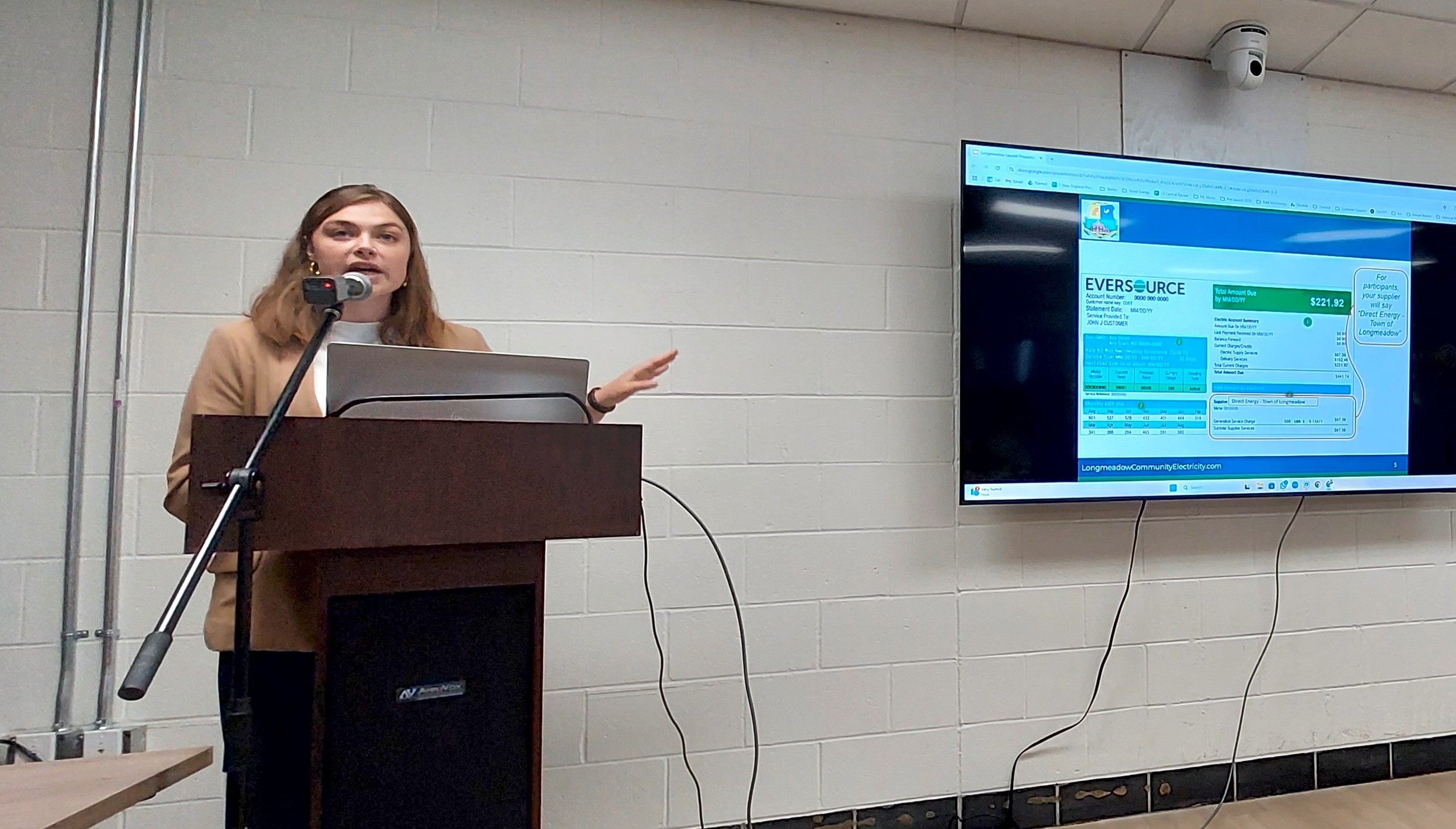Courtney VanHuffel of Good Energy answers a question about Longmeadow Community Electric.
Reminder Publishing photo by Sarah Heinonen
LONGMEADOW — It was standing-room-only in the conference room at the Longmeadow Town Offices on July 8 as more than 150 people came in person and another 70 attended online to ask questions about Longmeadow Community Electric.
Longmeadow Community Electric is a municipal aggregate electricity program. As Town Manager Lyn Simmons explained, in 2023, she and then-Select Board member Mark Gold discussed the hike in energy prices that accompanied Russia’s invasion of Ukraine.
They began looking at ways to reduce energy costs for residents and, with the approval of Town Meeting, pursued an aggregate electricity program. The idea behind such programs is that the municipality purchases electricity in bulk for its residents and businesses.
Courtney VanHuffel of Good Energy, a company with which the town contracted to vet energy companies and compare bids, explained that electric bills have two main parts: supply and distribution. Eversource owns the poles and wires that carry electricity to homes and businesses and charges a distribution along that infrastructure. An aggregate electricity program cannot change that cost. However, because of the collective buying power of an aggregate program, energy companies bid to supply electricity to residents and businesses, potentially at lower rates compared to those available commercially.
The lowest bidder was Direct Energy. Working with the company, Longmeadow was able to secure a three-tier electric program that begins with the August meter read. The basic level costs 13.07 cents per kilowatt-hour, the standard level is 13.47 cents per kilowatt-hour and the plus level costs 14.38 cents per kilowatt-hour. The rate will be locked in 15 months. Eversource changes its supply rate every six months in keeping with the energy market. On Aug. 1, the company’s supply rate will be 13.493 cents per kilowatt-hour.
Aside from the price, the options are different in the amount of renewable energy that is supplied to the grid. The renewable energy comes from solar, wind, low-impact hydroelectric and anaerobic digester resources in southern New England. VanHuffel said the state’s current standard for electricity suppliers requires 63% of the energy to come from renewable sources and both Eversource and the aggregate program’s basic option use this level of renewable energy. The standard option includes 10% more renewable energy credits, while 100% of the plus level is offset by renewable energy credits.
VanHuffel said that electric customers who currently receive their supply through Eversource will automatically be enrolled in the standard option. To avoid enrollment in the program, people can opt out by July 19 by calling Direct Energy at 866-968-8065 or visiting tinyurl.com/2s4yd9se. After the start of services, customers can opt in or out at any time with no penalty. If a customer opts out and then, back in, VanHuffel said Direct Energy reserves the right to charge them the market rate. Although, she noted that this usually only happens with medium-to-large companies.
Some people are already using a third-party supplier. VanHuffel said that because some third-party suppliers charge an early termination fee, these residents will not be automatically enrolled. Similarly, if a customer has a third-party block, automatic enrollment will not occur. People can call Eversource at 877-659-6326 to check if they have a block or remove it, if desired. If someone with a third-party supplier or a third-party block wants to enroll, they can still do so by calling Direct Energy or visiting tinyurl.com/22esurud. These options also allow customers to change their level of service.
VanHuffel said the aggregate program is different than other third-party options because the terms have been negotiated on the residents’ behalf. Additionally, the program’s price is locked in, while third party suppliers will sometimes change a customer to variable rates, which reflect different costs for peak hours and seasons.
Resident Curt Friedman spoke at the meeting and said variable rates are preferred for some people and offered to help residents decide which supplier is a better deal.
VanHuffel cautioned that she could not guarantee the program’s rates would be lower than those set by Eversource on Feb. 1, 2026, or Aug. 1, 2026. However, she said the program is “the option for stability.” However, Simmons said the “track record” for the municipal aggregate programs in towns that have worked with Good Energy “has always been lower than what Eversource provides.”
One person asked what would happen when the contract with Direct Energy expires. VanHuffel said the town could choose to go out to bid again. The available rates might be higher or lower then, depending on the market. She said the town would undertake another outreach period to let people know their rates might change.
A resident said the state runs a website, energyswitchma.gov, that shows the prices of different suppliers. He asked why Direct Energy was not listed. While VanHuffel did not know the answer, she said Direct Energy was a large company that Good Energy had vetted and worked with in the past. She acknowledged that people could shop around. If many people opt-out during this contract period, VanHuffel said the town might have weaker buying power and receive higher rates when negotiating the next contract, but she said she had never seen that happen.
While answering other questions, VanHuffel said the program requires no new equipment, solar credits remain valid and customers that use discounts through Eversource would still see them applied to their bill.


